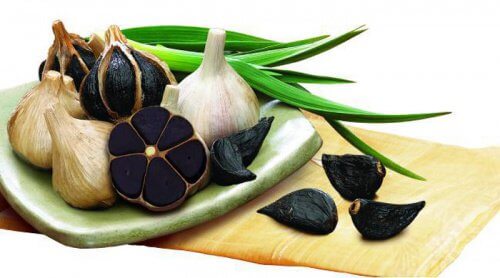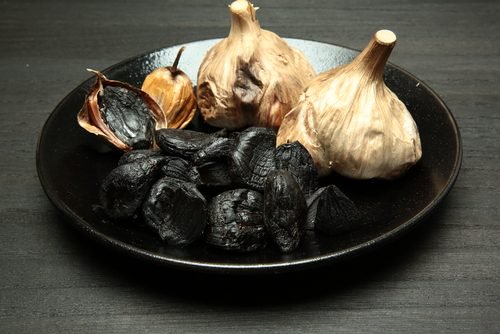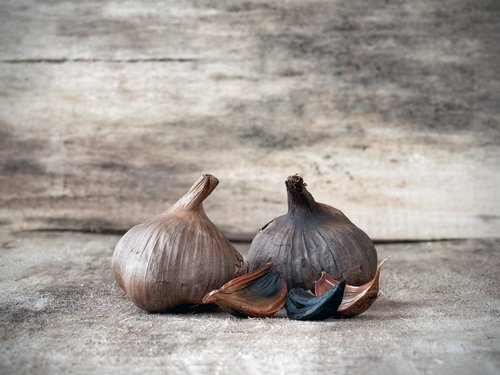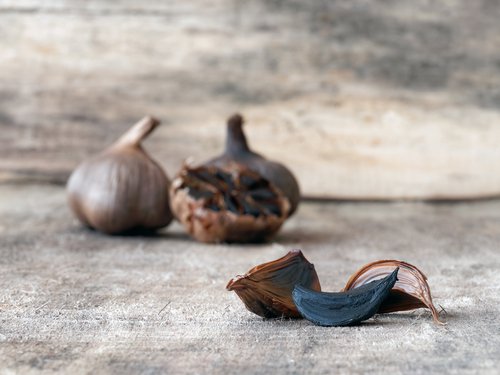Black Garlic: Learn All About its Benefits

If you’ve read that eating a clove of garlic first thing in the morning is very good for your health but don’t want to have that characteristic taste in your mouth all day, we have some great news for you. You can eat black garlic instead! Not only does it increase our defenses, but you also won’t have to be brushing your teeth constantly.
What you need to know about black garlic

Also known as “aged garlic,” black garlic is made through a process of slow cooking or aging. The result is this dark vegetable with an even higher concentration of nutrients than traditional garlic.
Its very popular in Asia, especially in Japan, where they use it as a seasoning.
The process of preparing black garlic is simple. Garlic heads are fermented at a specific temperature (around 70°C/158°F) and humidity (between 85 and 90%).
There’s no yeast or bacteria involved. It’s a slow process, but what you get is this amazing vegetable that’s becoming a very popular natural remedy.
Black garlic has a slightly sweet, somewhat acidic flavor. The cloves end up being much smaller, but their curative properties become much more highly concentrated.
It also loses that invasive smell that common garlic has. Despite its burnt appearance, it has a soft, creamy texture, so it’s great for spreading, cooking, or eating by itself.
It has become a complement to a lot of diets because it’s a great side dish and a superfood that your body shouldn’t miss out on.
Although the origins of black garlic aren’t clear, some believe it came out of the work of Japanese scientists who wanted to get rid of the strong smell of white garlic. They tried smoking it for a few hours, and it worked!
It didn’t take long to find uses for this “new ingredient,” and it quickly spread to other places.
Read also: 6 Problems when your Intestinal Bacteria is out of Control
What’s black garlic good for?
Aged garlic has countless wonderful properties. Some things that stand out are its antibiotic, diuretic, antioxidant and digestive powers, but it has many more.
- It contains sulfur compounds, linoleic acid, and polyphenols.
- It also provides 18 of the 20 amino acids, including the 8 essential amino acids available in nature.
- Its properties are 10 times as strong as those of fresh garlic.
Its other benefits include:
It prevents cardiovascular disease
It’s a great ally for heart and circulatory health because it’s an antioxidant and reduces hypertension (thanks to its allicin content).
It also thins the blood, reduces clotting, and minimizes the risk of stroke and thrombosis.
It’s a great diuretic
It also provides a healthy dose of potassium, which is why this form of garlic is great for people dealing with fluid retention, edemas, or kidney problems.
When you eat it on an empty stomach, black garlic can eliminate excess water from your body.
It increases collagen
People with skin problems (including dermatitis, acne, psoriasis, and rosacea), or certain joint problems, should eat it raw.
It contains sulfur compounds (tiosulphinates). These can boost collagen formation. This means it’s really good for people with arthritis and muscular pains.
It improves your defenses

If you get ill frequently because your immune system is weak, you should eat black garlic. It’s a powerful home remedy to improve your defenses and combat viruses and bacteria.
It fights fatigue
Aged garlic is good for athletes or anyone who wants to improve their physical resistance. It’s also good for fighting chronic fatigue or exhaustion from working excessively or from a lack of regular sleep.
It’s a great antioxidant
Without a doubt, black garlic is a great ally in the fight against the premature aging of the cells. Plus, it helps eliminate free radicals which can cause all kinds of illnesses if there’s an excess of them.
Treats respiratory problems
Aged garlic is very good for reducing asthma and allergy symptoms . Plus, it helps alleviate colds, pharyngitis, laryngitis, and other common respiratory problems.
It calms your nerves
Eating black garlic can work as a natural remedy to reduce excess stress. It works to calm anxiety, fight insomnia, and reduce irritability and bad moods.
Other effects of black garlic
Along with the things above, black garlic fights constipation, reduces cholesterol, and has anti-carcinogenic properties thanks to its cysteine content.
Basically, it’s great!
How to eat black garlic

Now that it’s “in fashion”, it’s easy to get hold of a head of black garlic in natural health food shops.
It’s also a popular ingredient among renowned chefs in Asian, European and American restaurants.
- It’s best to eat 1-3 cloves of aged garlic a day, always on an empty stomach.
- You can also spread it on a slice of bread or toast as part of your breakfast.
- Remember not to eat it before resting. It has an energizing effect and can cause insomnia in some people.
Athletes can add a clove of black garlic to their smoothies and meals before exercising. After all, it improves performance, even for athletes at an elite level.
If you’d like, you can add it to your meals in sauces, soups, cakes, or rice or pasta dishes. It’s also perfect with meat, fish, and vegetables.
You can keep black garlic at room temperature in a plastic bag or a glass flask for a year without any issue.
All cited sources were thoroughly reviewed by our team to ensure their quality, reliability, currency, and validity. The bibliography of this article was considered reliable and of academic or scientific accuracy.
- Ryu JH, Kang D. Physicochemical Properties, Biological Activity, Health Benefits, and General Limitations of Aged Black Garlic: A Review. Molecules. 2017 Jun 1;22(6):919. doi: 10.3390/molecules22060919. PMID: 28587168; PMCID: PMC6152780.
- Tsai JC, Chen YA, Wu JT, Cheng KC, Lai PS, Liu KF, Lin YK, Huang YT, Hsieh CW. Extracts from Fermented Black Garlic Exhibit a Hepatoprotective Effect on Acute Hepatic Injury. Molecules. 2019 Mar 20;24(6):1112. doi: 10.3390/molecules24061112. PMID: 30897831; PMCID: PMC6471182.
- Jeong YY, Ryu JH, Shin JH, Kang MJ, Kang JR, Han J, Kang D. Comparison of Anti-Oxidant and Anti-Inflammatory Effects between Fresh and Aged Black Garlic Extracts. Molecules. 2016 Mar 30;21(4):430. doi: 10.3390/molecules21040430. PMID: 27043510; PMCID: PMC6274159.
This text is provided for informational purposes only and does not replace consultation with a professional. If in doubt, consult your specialist.








